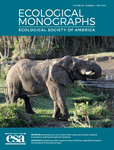
ECOLOGICAL MONOGRAPHS
Scope & Guideline
Delivering high-impact research for the ecologists of tomorrow.
Introduction
Aims and Scopes
- Ecological Dynamics and Community Assembly:
The journal explores the assembly and dynamics of ecological communities, emphasizing how species interactions, environmental changes, and disturbance regimes shape community structures. - Climate Change and Its Ecological Impacts:
Research on the effects of climate change on biodiversity, species distributions, and ecosystem functions is a core focus, highlighting how organisms and communities adapt to changing conditions. - Biodiversity and Ecosystem Functioning:
ECOLOGICAL MONOGRAPHS publishes studies investigating the relationship between biodiversity and ecosystem processes, including how species diversity influences ecosystem resilience and productivity. - Integrative and Interdisciplinary Approaches:
The journal encourages integrative research that combines ecological theory with other disciplines, such as genetics, evolutionary biology, and environmental science, to address complex ecological questions. - Longitudinal and Experimental Studies:
A significant emphasis is placed on long-term ecological studies and experimental approaches that provide insights into ecological processes over time and under varying conditions. - Quantitative and Theoretical Models:
The use of quantitative models and theoretical frameworks to understand ecological phenomena is a hallmark of the journal, facilitating predictions and interpretations of ecological data.
Trending and Emerging
- Ecological Resilience and Response to Disturbances:
Recent publications emphasize the resilience of ecosystems and species to disturbances, including fire and climate change, highlighting adaptive management strategies for conservation. - Integrating Genomics and Ecology:
There is a growing trend towards incorporating genomic data and approaches to understand ecological dynamics, population genetics, and conservation strategies. - Impact of Anthropogenic Changes on Ecosystems:
Research focusing on the effects of urbanization, agriculture, and land use changes on ecological dynamics and biodiversity is on the rise, reflecting increasing human impacts on natural systems. - Functional Traits and Ecosystem Processes:
Emerging studies are increasingly examining the role of functional traits in mediating ecosystem processes, linking species characteristics to ecological outcomes. - Climate Change Adaptation Strategies:
Research on adaptive strategies for species and ecosystems in response to climate change is gaining traction, including studies on phenotypic plasticity and range shifts. - Social-Ecological Systems:
There is an increasing focus on the interplay between human systems and ecological dynamics, emphasizing the need for interdisciplinary approaches to address complex environmental issues.
Declining or Waning
- Traditional Species Distribution Studies:
Research solely focused on static species distribution models has become less prominent, as the field shifts towards dynamic models that account for ecological interactions and climate change. - Historical Ecology without Contemporary Context:
While historical ecology remains relevant, studies that do not integrate contemporary ecological processes or climate impacts are less frequently published. - Single-Trophic Level Studies:
Research focusing exclusively on single trophic levels is declining in favor of more holistic approaches that consider multi-trophic interactions and ecosystem networks. - Descriptive Studies with Limited Analytical Depth:
There has been a noticeable decrease in purely descriptive studies lacking robust analytical frameworks or theoretical underpinnings, as the journal emphasizes more rigorous analytical approaches. - Local Scale Studies without Broader Implications:
Research that only addresses local ecological phenomena without broader ecological implications or connections to global change issues is becoming less common.
Similar Journals

BIOTA NEOTROPICA
Unlocking the Secrets of Neotropical BiodiversityBIOTA NEOTROPICA is a prominent open access journal dedicated to advancing knowledge in the interdisciplinary field of ecology, evolution, behavior, and systematics. Published by REVISTA BIOTA NEOTROPICA since 2001, this Brazilian journal aims to provide a platform for high-quality research that fosters a deeper understanding of Neotropical biodiversity and its conservation. With an ISSN of 1676-0603 and an E-ISSN of 1676-0611, the journal has established its reputation within academic circles, ranking in the Q3 quartile for Ecology and achieving a respectable percentile of 57 in Scopus’s metrics. Operating from its headquarters in Campinas, SP, Brazil, BIOTA NEOTROPICA not only focuses on research dissemination but also encourages collaboration and exchange of ideas among scientists, students, and professionals in the field. The journal is particularly valuable for those looking to contribute to the understanding of ecological systems and promotes accessibility with its open access model.

Global Ecology and Conservation
Empowering conservation through open-access research.Global Ecology and Conservation, published by Elsevier, stands as a premier open-access journal dedicated to advancing the field of ecology and conservation science. Since its inception in 2014, the journal has facilitated the dissemination of high-quality research, fostering critical dialogue on ecosystem management, biodiversity preservation, and sustainability practices across the globe. With a remarkable ranking within the top quartiles (Q1) in various categories including Ecology, Evolution, Behavior and Systematics, and Nature and Landscape Conservation, it is positioned among the leading resources for researchers and professionals alike. The journal has garnered a notable impact, ranking #65 out of 721 in Ecology, and houses articles that are vital to understanding and addressing the pressing environmental challenges of our time. Available in an open-access format, researchers can freely access and share vital findings, promoting a collaborative approach to ecological research. Global Ecology and Conservation is not just a publication; it is a critical tool for innovation and advocacy in conservation, poised to inspire the next generation of environmental stewards.

RUSSIAN JOURNAL OF ECOLOGY
Exploring the Rich Tapestry of Russia's Ecological LandscapeRUSSIAN JOURNAL OF ECOLOGY, published by PLEIADES PUBLISHING INC, stands as a critical resource within the field of ecology, offering an array of research insights that span various ecological topics. With an ISSN of 1067-4136 and an E-ISSN of 1608-3334, this journal has been consistently disseminating knowledge since its inception in 1996, now converging towards 2024. Despite its current Q4 ranking in the Ecology, Evolution, Behavior and Systematics category, the journal has carved out a niche in the publication landscape, particularly for scholars focused on the rich and diverse ecological phenomena of Russia and surrounding territories. The journal aims to foster interdisciplinary collaboration and innovation by providing a platform for the dissemination of high-quality research. While it currently lacks open access options, readers can expect in-depth studies and analytical discourses that contribute meaningfully to the global understanding of ecological systems. With an impressive Scopus rank, this journal remains an important outlet for researchers, professionals, and students committed to advancing ecological science.

Nature Conservation Research
Exploring the intersection of science and environmental stewardship.Nature Conservation Research is a prominent open-access journal that has been dedicated to advancing the field of conservation science since its inception in 2016. Published by the SARANSK FOND PODDERZKI & RAZVITIA ZAPOVEDNYH in the Russian Federation, this journal serves as a vital platform for researchers, professionals, and students alike, providing critical insights into ecological and environmental issues. With an impressive impact factor and ranked in the second quartile across multiple categories—including Agricultural and Biological Sciences, Earth and Planetary Sciences, Ecology, and Nature and Landscape Conservation—Nature Conservation Research stands at the forefront of impactful scientific discourse. The journal not only aims to disseminate high-quality research findings but also seeks to foster collaboration and innovation in conservation practices globally. By ensuring open access to its content, it promotes widespread dissemination of knowledge, crucial in the fight against biodiversity loss and environmental degradation. Researchers and practitioners contributing to the journal will find themselves at the convergence of science and conservation efforts, paving the way for sustainable ecosystem management.

Ecological Processes
Advancing ecological understanding for a sustainable future.Ecological Processes, published by Springer, is a premier open-access journal dedicated to advancing the understanding of ecological modeling and ecological processes. With a significant impact factor evidenced by its prestigious Q1 ranking in both Ecological Modeling and Ecology categories, as well as impressive Scopus rankings—41st out of 461 in Environmental Science and 7th out of 41 in Ecological Modeling—this journal is a vital resource for researchers, professionals, and students alike. Established in 2012 and operating under an open-access framework since its inception, Ecological Processes strives to provide a platform for high-quality research that addresses critical ecological challenges, ensuring wide dissemination of its articles to a global audience. The journal's focus encompasses various aspects of ecological modeling as well as practical implications for managing natural resources, making it an essential publication for anyone interested in the dynamics of ecological systems and their implications for sustainability.
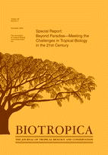
BIOTROPICA
Exploring the dynamics of ecosystems and their conservation.BIOTROPICA is a premier journal published by Wiley, specializing in the fields of Ecology, Evolution, Behavior, and Systematics. With a robust impact factor and positioned in the Q1 category in its field, it stands out as a leading source of research that informs and shapes our understanding of biodiversity and ecosystem management. Since its inception in 1979, BIOTROPICA has been dedicated to publishing high-quality articles that advance scientific knowledge and foster conservation efforts globally. Researchers and professionals alike value the journal for its rigorous peer-review process and its influence in academic discourse, demonstrated by its Scopus ranking placing it in the 70th percentile among its peers. While the journal does not currently offer open access, it continues to be a vital resource for those engaged in the study of biological systems, making significant contributions to the advancement of ecological science. Readers can expect to find a wealth of innovative research and perspectives that are critical to addressing contemporary environmental challenges.
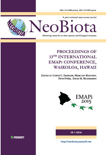
NeoBiota
Unveiling the intricacies of ecosystems and their dynamics.NeoBiota, published by Pensoft Publishers in Bulgaria, is a preeminent Open Access journal dedicated to advancing knowledge in biodiversity, ecology, and conservation science. Since its inception in 2011, it has established itself as a pivotal platform for scholarly discourse, maintaining an impressive impact factor that places it in the Q1 quartile across multiple categories, including Animal Science and Zoology, Aquatic Science, and Ecology. With its articles indexed in leading databases and Scopus rankings that affirm its standing (e.g., rank #12 in Animal Science and Zoology), NeoBiota serves as a vital resource for researchers, professionals, and students. The journal emphasizes the synthesis of ecological modeling and evolutionary processes, fostering interdisciplinary collaboration and promoting rigorous research methodologies. Authors are encouraged to contribute their insights on biodiversity metrics, ecosystem dynamics, and the ecological implications of anthropogenic changes, making NeoBiota essential for anyone invested in the future of our planet's ecosystems. Discover the treasures of ecological scholarship through this influential journal.
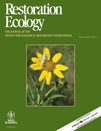
RESTORATION ECOLOGY
Empowering Restoration through Innovative ResearchRESTORATION ECOLOGY is a leading international journal dedicated to the science and practice of ecological restoration, published by WILEY. With an ISSN of 1061-2971 and a robust E-ISSN of 1526-100X, this journal has successfully positioned itself within the top quartiles (Q1) in significant categories such as Ecology, Evolution, Behavior and Systematics, and Nature and Landscape Conservation, showcasing its high-impact contributions to these vital fields. RESTORATION ECOLOGY has been actively disseminating critical research since 1993 and continues to thrive as it converges toward 2024. Ranked impressively within Scopus, it stands at #98 out of 721 in Agricultural and Biological Sciences and #30 out of 211 in Environmental Science, emphasizing its substantial influence and reach. While the journal operates under traditional access guidelines, it serves as an invaluable resource for researchers, professionals, and students alike, aiming to advance knowledge and practical solutions for biodiversity conservation and ecosystem rehabilitation globally. For those interested in the intersection of ecological theory and practical restoration applications, RESTORATION ECOLOGY is a key outlet for fostering dialogue and collaboration.
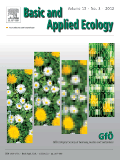
BASIC AND APPLIED ECOLOGY
Advancing ecological understanding for a sustainable future.BASIC AND APPLIED ECOLOGY, published by Elsevier GmbH in Germany, stands out as a premier journal in the field of ecology, evolution, behavior, and systematics. With its ISSN 1439-1791 and E-ISSN 1618-0089, the journal enjoys a distinguished reputation, evidenced by its classification in the Q1 category for Ecology in 2023 and impressively ranking #89 out of 721 in this domain according to Scopus. Since its inception in 2000, it has served as a vital platform for disseminating high-quality research that bridges theoretical insights and practical applications in ecology. Researchers, professionals, and students alike can look forward to the latest findings that not only foster a deeper understanding of ecological processes but also inform sustainable practices crucial for our environment. As the journal continues its journey through to 2024, it remains committed to advancing ecological knowledge and supporting innovative research in an ever-evolving field.

ECOGRAPHY
Fostering Global Collaboration in Ecological ScienceECOGRAPHY, published by WILEY, stands at the forefront of ecological and evolutionary research, with an impressive Impact Factor reflecting its esteemed position in the Q1 category of Ecology, Evolution, Behavior, and Systematics. Operating since 1978 and transitioning to a fully Open Access model in 2020, the journal is dedicated to disseminating high-quality research that influences conservation practices and enhances our understanding of ecological dynamics. With an ISSN of 0906-7590 and an E-ISSN of 1600-0587, ECOGRAPHY has garnered a remarkable placement in Scopus rankings, being in the top 4% of its category, achieving an impressive rank of #27 out of 721 in Agricultural and Biological Sciences. Academics from around the globe benefit from the research published in this journal, which seeks to engage and inspire further exploration of ecological systems. For inquiries, ECOGRAPHY can be reached at their UK address: 111 River St, Hoboken 07030-5774, NJ.